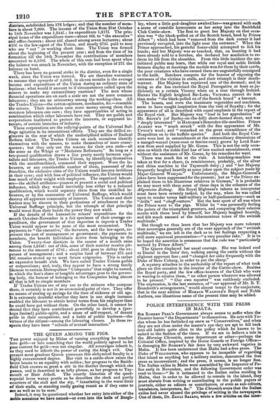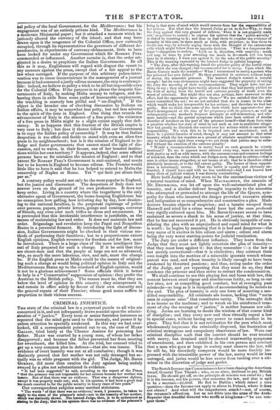POLICE INTERFERENCE WITH THE PRESS IN MALTA.
SIR ROBERT PEEL'S Government always seems to suffer when the Premier leaves " the Departments" to themselves. He acts with To- ries whom he has furbished up anew as "Conservatives," and when they are not close under the master's eye they are apt to fall back into old habits quite alien to the policy which he knows to be suited to the fashion of the times. If we are to believe a tale in the Morning Chronicle, some department or other—perhaps the Colonial Office, inspired by the Horse Guards or Foreign Office— is damaging Sir Ronzar's fair fame by very awkward vagaries in Malta. It has been understood that Malta had a free press. The Duke of WELLINGTON, who appears to be incapable of regarding that island as anything but a military station, denounced the free press as inconvenient ; and the press, it seems, is no longer free. The Italian exiles in Malta were assembled by the Inspector of Po- lice early in November, and the following Government order was read to them—" Be it intimated to the Italian exiles residing in Malta, that in order to be allowed to remain in the island, they must abstain from writing or contributing to the public papers or journals, either as editors or contributors, or even as sub-editors, translators, interpreters, &c." The Chronicle avers that the Italian exiles had never abused the privilege of writing in the newspapers. One of them, Dr. Zama SALIN; wrote a few articles on the inter- nal policy of the local Government, for the Mediterraneo ; but his engagement was of an entirely private kind. The Mediterraneo is a moderate Ministerial paper ; but it attacked a measure which in- juriously altered the currency of the island; and that may have drawn upon it the vengeance of the Colonial Office, now curiously occupied, through its representatives the governors of different de- pendencies, in experiments of currency-debasement, little to have been looked for under any Government which Sir ROBERT PEEL commanded or influenced. Another surmise is, that the order ori- ginated in a desire to propitiate the Italian Governments. Be all this as it may, Englishmen will regard with disgust the resort to any measure against the press, except that of a fair appeal to the law when outraged. If the purpose of this arbitrary police-inter- vention was to cause inconvenience in the management of a journal because it had censured a justly odious measure, the step is contempt- ible: indeed, we believe so paltry a trick to be all but impossible even for the Colonial Office. If the purpose is to please the despotic Go- vernments of Italy, by making Malta uneasy to refugees, and de- barring them in exile from some paths of honourable employment, the truckling is scarcely less pitiful and " un-English.' If the object is the broader one of checking discussion by Italians on Italian affairs, it may be somewhat less petty, but not less adverse to the spirit of the time in England. One thing that retards the advancement of Italy is the absence of a free press: the existence of a free press in Malta might to a slight extent supply that defi- ciency. It so happens that this fraction of the British empire is very near to Italy ; but does it thence follow that our Government is to copy the Italian policy of censorship ? It may be that Italian despotism is too effete and feeble to stand with even an alien free press in its neighbourhood ; but is it the mission of England to in- dulge and foster governments that cannot stand the light of dis- cussion, and to waive, in their favour, one of her boasted institu- tions within her own territory ? It appears, indeed, that some official persons have so far mistaken the mission of England : and to that extent Sir ROBERT PEEL'S Government is anti-national, and needs but to be known in England to become odious. The Premier would little like to have it said that he has helped to extend to Malta the censorship of Naples or Rome. Yet " qui facit per alium facit per se."
A contrary policy would not only be the most popular in England, but the justest and discreetest. The despotism of Italy does not answer even on the ground of its own professions. It does not keep order. Living in a country where the taxgatherer is the only obtrusive agent of Government, the home-keeping Englishman has no conception bow galling, how irritating day by day, how deaden- ing to the national faculties, is the perpetual espionage of police over persons, papers, private letters, goings and comings, converse of friends, nay even over such trifles as dress and amusement. It is pretended that this intolerable interference is justifiable, as the means of maintaining law and order. It does not maintain law and order. Brigandage and revolution keep the Papal and Neapolitan States in a perennial ferment. By introducing the light of discus- sion, Italian Governments might be checked in their vicious me- thods of performing their functions ; but to a proportionate extent English opinions, English reverence for freedom and for law, must be introduced. There is a large class of the more intelligent lite- rati of Italy prepared for such a change. If it be said that they are closet-men and that the people at large are not so advanced, why, so much the more laborious, slow, and safe, must the change be. If the English press at Malta could be the means of originat- ing such a change as would bring political opinion in Italy and the Mediterranean States up to the standard of English opinion, would it not be a glorious achievement ? Some officials think it better to help in a" Conservative" suppression of opinion : they prefer the Austrian to the British policy. The reason must be, that they are below the level of opinion in this country : they misrepresent it, and remain in office solely by favour of their own obscurity and the general repute of their Premier; whose good name suffers in proportion to their vicious success.



























 Previous page
Previous page